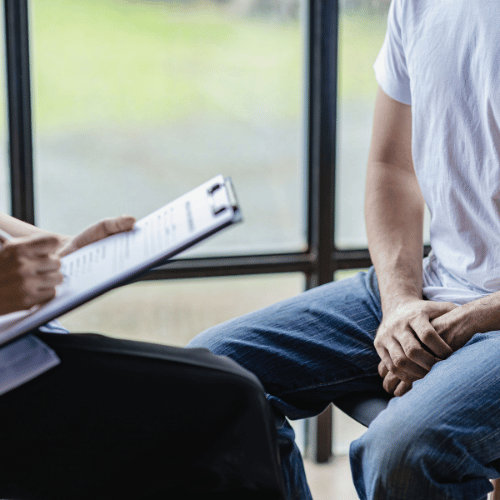
Men: Boost Testosterone & Balance Hormones with This Guide
Research has confirmed that engaging in regular physical activity is one of the most effective ways to boost testosterone levels.
Men Health > Testicular Cancer

Find Out More


Testicular cancer occurs when abnormal cells in the testicles (the male reproductive organs that produce sperm and hormones) grow uncontrollably.
It is relatively rare but is one of the most common cancers in young men aged 15 to 35. Early detection and treatment are crucial for the best outcomes.

The most common symptom of this disease is a painless lump or swelling in either testicle. Other possible symptoms include:
If you notice any of these symptoms, it is incredibly important to consult with a healthcare professional as soon as possible.
The exact causes of testicular cancer remain unclear.
It begins when healthy cells in the testicle start to exhibit abnormal behaviour, leading them to multiply uncontrollably and form a mass.
Several risk factors have been identified that may increase the likelihood of developing testicular cancer.
These include cryptorchidism, a condition where one or both testicles fail to descend properly, a family history of testicular cancer, and age, as it predominantly affects younger men.
Additionally, race plays a role, with white men being at a higher risk compared to other racial groups.


Testicular cancer is classified into stages based on how far it has spread, which helps in planning the most effective treatment.
In Stage 0, cancer is confined to the testicles and has not spread beyond them. In Stage I, cancer has spread to the testicle but remains localised.
Stage II indicates that cancer has spread to nearby lymph nodes. By Stage III, cancer has metastasised to distant parts of the body, such as the lungs or liver.
Your treatment plan will be tailored according to the stage and specific characteristics of your cancer.
Diagnosing testicular cancer typically involves several steps.
First, one of our doctors will perform a physical examination to check for lumps or abnormalities.
Following this, an ultrasound of the testicles is often conducted to determine whether a lump is solid or fluid-filled.
Additionally, blood tests may be used to measure levels of tumor markers, substances that could be elevated in testicular cancer.

While there is no guaranteed way to prevent testicular cancer, certain practices can help with early detection:
Use our online booking engine or book your test by giving us a call.
On the online booking engine select the “appointment type” you need.
You will be seen by one of our friendly doctors or trained clinicians.

Expect a physical exam, including an examination of the testicles and groin area; therefore, wearing comfortable clothing is advised. Prepare questions about any symptoms or changes you have noticed in the testicles. Be ready to discuss your symptoms, medical history, and any concerns with your healthcare provider. They may ask about any recent changes in your health, pain, or lumps in the testicular area.

The provider will perform a physical exam, including checking for swelling, lumps, or abnormalities by gently feeling the testicles and surrounding area for any unusual masses or tenderness. You may be asked to cough or change positions during the exam. Depending on the findings from the physical examination, additional tests may be ordered, such as an ultrasound to visualise the testicles and identify any abnormalities, and blood tests to check for tumor markers.

The timing for receiving test results for testicular cancer can vary based on several factors, such as physical examinations, imaging tests, blood tests, and consultations. Your healthcare provider will discuss the findings with you once all tests are complete. If cancer is suspected or diagnosed, they will explain the next steps, which may include further tests, staging, and treatment options.
Incorporated
in 1998
Experienced doctors & a professional team
Registration
not needed
Up-to-date with the latest treatments & testing
Strictly
confidential
Experienced doctors & a professional team
Affordable private
health care
Transparent fee structure with no hidden charges
We work with experienced consultants & healthcare professionals who have received positive feedback from our patients, and with whom we have established long-term relationships.
Latest Episode
Tune in to our podcast to explore the world of healthcare and learn from distinguished special guests. We cover everything from preventative measures to cutting-edge treatments so that you can stay informed and up-to-date on health-related things.

Research has confirmed that engaging in regular physical activity is one of the most effective ways to boost testosterone levels.

Your 40s can bring key health changes. At Walk-in Clinic, we highlight eight common concerns men face, and why early

Men face specific health concerns that require attention. Understanding these issues helps support better decisions, prevention, and overall well-being.
Subscribe for latest updates & news


From same-day private GP and blood test appointments to visa medicals, a sexual and reproductive health clinic, and preventative health screenings, we are here to help.
Contact Us
Accepted Insurance Companies






Please note that Walk-in Clinic is a private medical centre & not an NHS service. Harley Walk-in Clinic Ltd company registration no. 07472804